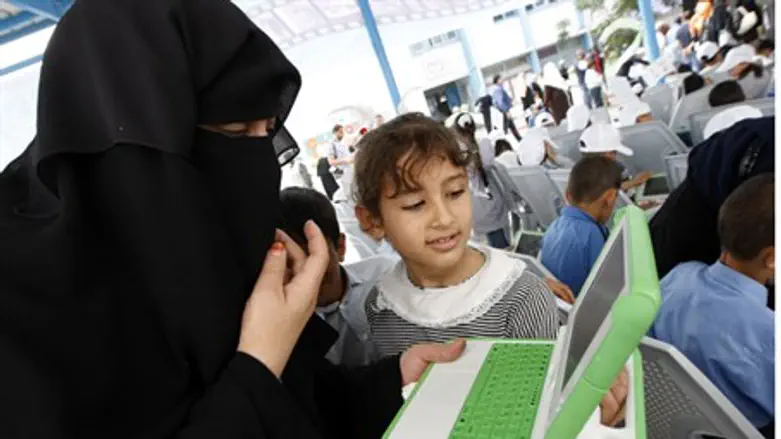
As long as Israel's own Ministry of Foreign Affairs continues to support the United Nations agency that aids Palestinian Authority Arabs, the U.S. and Canada are not going to cease funding UNRWA's activities.
So writes historian and journalist Moshe Dann, who advocated in a blog posted Sunday for FrontPage Mag that Israel end its own support for the U.N. agency.
“Supporters of Palestinian statehood prominently display '194' next to their flag,” Dann pointed out in his article. “That number refers not only to its proposed place in the U.N. next-in-line, but their goal. Citing the Universal Declaration of Human Rights (1948) as guarantor of the right to leave and return to one's country, they use that to justify the 'Palestinian right of return.'
“But there is no such 'right,'” Dann continued. “UNGA Resolution 1943 (1948) refers to all refugees, Jewish as well as Arab, and does not confer automatic rights to return. Repatriation (or return) was suggested as one option, but this is based on conditions that Arabs have never fulfilled.”
UNRWA, Dann contends, is at the core of the thorny problem of the so-called Palestinian Arab “right of return,” due to its anti-Israel agenda, holding the Jewish State solely responsible for the plight of those who left their homes during Israel's defensive wars.
The countries to which they fled, and which have forever refused to accept them as citizens, have never been held accountable in the same way Israel is expected to absorb its own refugees.
Jordan is the only one of all the Arab nations who granted the original refugees citizenship. Most “Palestinian refugees” in other Arab countries are blocked from getting a decent education, going to college, or applying for skilled jobs. It is a built-in system to create human weapons to aim at the State of Israel, one that has been inordinately effective over the decades, aided and abetted by UNRWA.
But why?
A recent example of the double standard applied to Israel is the world's expectation that the Jewish State absorb and care for thousands of Sudanese and Eritrean infiltrators that have illegally crossed the country's southern border with Egypt. They are doing it even now, in fact – a swelling population of irrelevant immigrants Israel can ill afford.
A great hue and cry is raised whenever the subject of “repatriation” is considered for these illegal infiltrators, which Israel with its meager resources is not equipped to care for.
Still, the country has somehow managed to wrestle with the problem, despite the overwhelming objections of most of the communities in which the refugees are eventually settled.
What then of the millions of so-called Palestinian refugees – actually the descendants of the original refugees, those who were encouraged to leave their homes, by the very Arab nations to whom they fled?
The question, according to Dann, is why Israel's own Foreign Ministry supports UNRWA, an agency whose humanitarian work he contends “can be assumed by the U.N. High Commission on Refugees (UNHCR), which assists all other refugees. Why continue to support a separate organization only for those who claim to be Palestinian refugees and their descendants?”
Israel's support for UNRWA, writes Dann, prevents donor countries from insisting on changing this picture – “thus enabling one of the most anti-Israel organizations to flourish.”
The agency, he points out, works with the members of terrorist groups such as Hamas, Fatah, PFLP and the Army of Islam, a group linked to the global jihadist Al Qaeda terrorist organization.
UNRWA provides free education, medical services, food and “social and cultural” centers through 60 “refugee camps” – actually towns, and in some cases some cities – throughout the region.
Half of UNRWA's annual budget, which totals nearly one billion dollars, is provided by the U.S., the rest by Canada and European nations.
What then is the incentive for PA Arabs in these areas, the terror gangs who recruit them, and the government who nurtures them, to change?